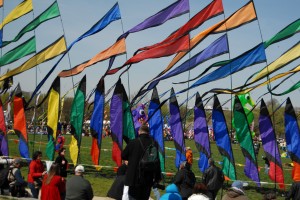
By Abhinav Venkat
UJW Staff
WASHINGTON — It is early on the day of the Smithsonian Kite Festival and paper birds have begun to drift across the sky. It is rather chilly but slowly, as the sun begins to shine, the kites multiply in variety and number.
The personalities of men, women and children have come together in the sky on a sunny Saturday in March as hundreds of sightseers and kite makers rejoice in their passion for kites.
On this day on the National Mall it is easy to tell that many of the kites reflect the personalities of their owners.
Take Dan Nooter, of Tacoma Park, Md., who participated in the festival’s kite competition. Professionally, he is a lawyer, but he says he enjoys creative projects.
“I wanted to try something new,” he says.
His kite is a vibrant, tri-panel piece representing the themes of both the nearby Cherry Blossom Festival and the kite event. The first panel depicts a branch of cherry blossoms surrounded by a splash of blue; the second portrays two origami cranes, crafted from the flags of the United States and Japan; the third pane shows the kanji (Japanese) character for kite written in large calligraphy.
And lastly, the tail of the kite is made of alternating American and Japanese flags that extend more than four feet.
“I wanted to show the friendship of the U.S. and Japan, which is central to this celebration,” he says.
He is reserved, but spares no detail in sharing how he represented himself in the design of the kite.
“I wanted to meld my creative outlook, and the scientific aspect of making this kite,” Nooter says.
Asked about his hopes of winning the competition, he says, “The kite’s been damaged and I’m afraid I will be disqualified.”
But his hopes are not dampened. He looks toward a tent in which a man repairs kites. Then with the unity of Japan and America in hand, he walks toward the tent, seeking an appointment with the kite doctor.
More than adults are welcomed on the field reserved for judging kites.
Children from all around the country have come to have their kites judged here, some on spring break, and some even younger ones with a fiery passion for kite building.
Seven-year-old Jillian Dalwerton has recently acquired a passion for kite making, according to her father, Bruce Dalwerton. They traveled from Reston, Va., to participate in the event. Jillian scampers across the field enraged that her handmade kite won’t fly.
She runs halfway across the field, while her father calls for her to come back and her kite lies on the grass. It resembles a traditional diamond kite, but is almost entirely made of small cutouts of blue peeps, a candy popular at Easter. In the center, there is another Easter-themed creation: a conglomeration of yellow peeps in the shape of the sun.
It is meticulously crafted, and from a distance, it looks like a brilliant sun set in a cerulean sky.
“The theme that she picked for her kite was world peace,” her father says.
When the judges arrive, they are playful with the girl, but her kite fails to take flight.
Another kiter, James Smith, 11, a resident of Indianapolis, has come to Washington, D.C. for spring break with his grandparents. He has created a kite that is reflects his love of sports.
“On this side is the (Indianapolis) Colts logo, and some of their symbols. The other side has the cherry blossoms,” Smith said before rushing to send his kite into the rising wind.
Hari Krishnan, contestant No. 215, is nearby with his kite flying high in the air.
“I’ve been flying kites for more than 20 years,” he says. “(His kite is) based on the Vancouver Olympics, and in the center we have the Olympic symbol with the rings mechanically made to spin with the wind.”
Krishnan’s kite is mostly white but silvery in the center.
“In India, we are culturally connected with kite flying, as it is part of our religious festivals,” he said.
But even for those who don’t participate in competition, the beauty of the festival is incentive enough to come, according to one observer.
Said Cindy Graw, a visitor from Bedminster, N.J.: “I don’t even own a kite, I borrowed one from my dad just to be here.”
Related stories:
Kites Transform Sky Over National Mall
Kite Festival Keeps Doctor on Call
Kite Enthusiast Celebrates His Native Jamaica


